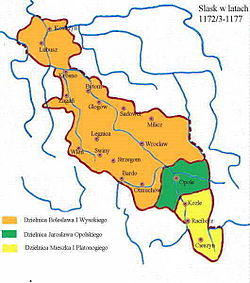Duchy of Ratibor
| Duchy of Racibórz | ||||||||||
|
Księstwo raciborskie (pl) Herzogtum Ratibor (de) Ratibořské knížectví (cs) |
||||||||||
| Silesian duchy | ||||||||||
|
||||||||||
|
Silesia 1172-77: Duchy of Racibórz (Mieszko Tanglefoot) in yellow, Duchy of Opole (Jarosław) in green
|
||||||||||
| Capital | Racibórz | |||||||||
| Government | Principality | |||||||||
| Historical era | Middle Ages | |||||||||
| • | Partitioned from Wrocław |
1172 | ||||||||
| • | United with Opole | 1202 | ||||||||
| • | Split off Opole | 1281 | ||||||||
| • | Vassalized by Bohemia |
1327 | ||||||||
| • | To Přemyslid dukes of Opava |
1337 | ||||||||
| • | United with Opole | 1521 | ||||||||
| • | Fell to Bohemia | 1532 | ||||||||
|
||||||||||
Duchy of Racibórz (German: Herzogtum Ratibor, Czech: Ratibořské knížectví) was one of the duchies of Silesia. Its capital was Racibórz in Upper Silesia.
After Bolesław I the Tall and his younger brother Mieszko I Tanglefoot backed by Emperor Frederick I Barbarossa had retained their Silesian heritage in 1163, the Duchy of Racibórz was formed in 1172 as a territory for Mieszko. It was centered on the towns of Racibórz, Koźle and Cieszyn. Mieszko's small share was enlarged the first time in 1177, when he received the territories of Bytom, Oświęcim, Zator, Pszczyna and Siewierz from his uncle High Duke Casimir II the Just of Poland. In 1202 Mieszko occupied the Duchy of Opole of his deceased nephew Jarosław, forming the united Duchy of Opole and Racibórz.
...
Wikipedia


